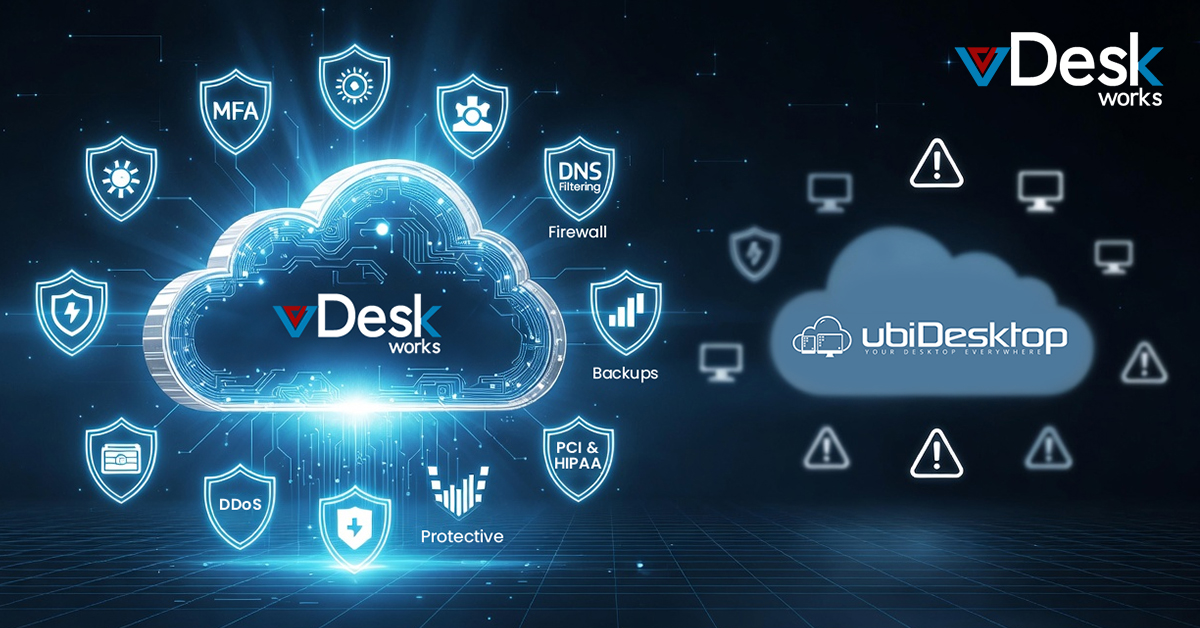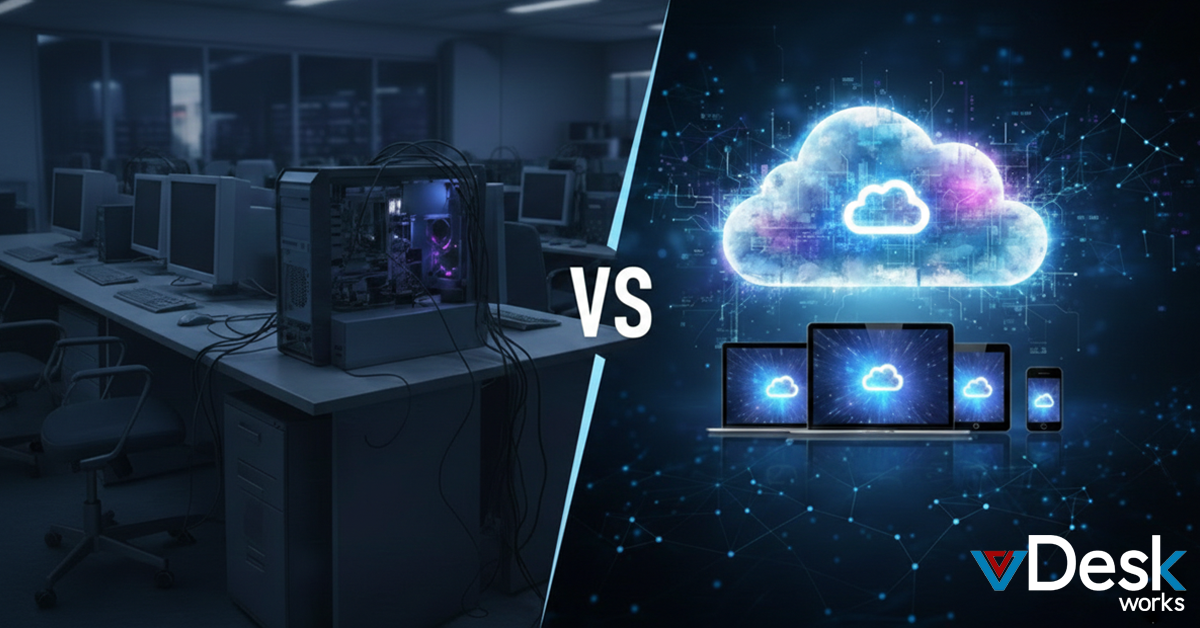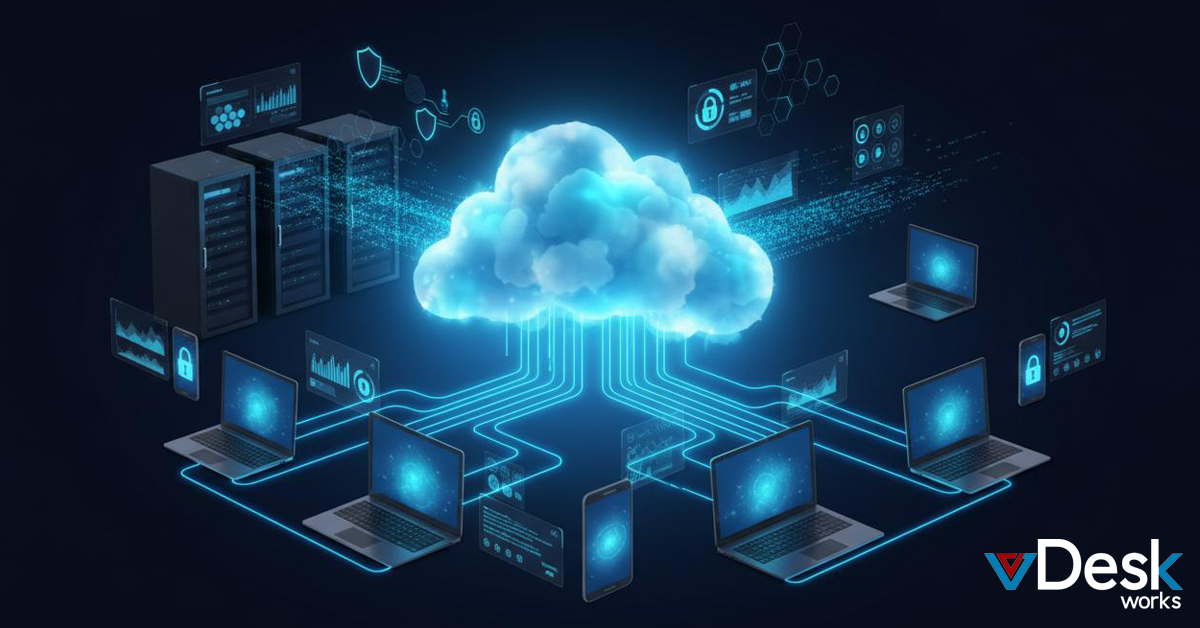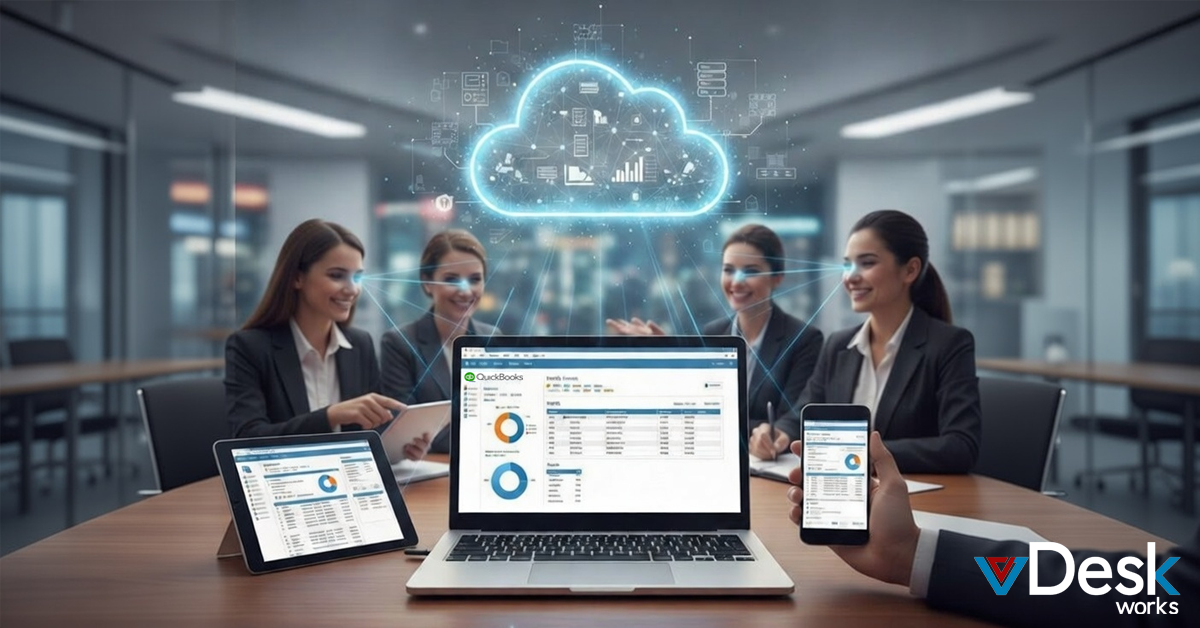With the rapid evolution of the digital world today, companies are reshaping the way employees access vital resources, particularly with increased remote and hybrid work environments. Virtual Private Networks (VPNs), Virtual Desktop Infrastructure (VDI), and Desktop-as-a-Service (DaaS) are the three leading solutions allowing for safe remote access. But how do they rate compared to one another, and which provides the best solution for cutting-edge organizations? This article delves into the advantages and disadvantages of Cloud DaaS, VDI solutions, and VPNs, with an emphasis on why vDeskWorks is a top virtual desktop solution.
Understanding VPNs: The Traditional Remote Access Solution
VPNs have been the standard for remote work for years, establishing a safe, encrypted pipe between a user's device and an organization's network. They enable employees to access internal assets, such as servers or databases, as if they were local in the office. VPNs are low-cost, with cost largely tied to subscription costs, and they're relatively easy to roll out for simple remote-access requirements. Yet, VPNs have major limitations.
Although VPNs protect connections, they don't offer an entire desktop experience or application-level control. Users must download and install software on individual computers, causing compatibility problems or security threats if the computers are not properly maintained. VPNs are also challenged in scalability, particularly for larger organizations, since they tend to involve complicated setup and high-end network infrastructure in order to handle numerous users. Performance may be affected by latency, especially for applications that are graphics-intensive or when team members are geographically distributed.
VDI: A Solid but Resource-Consuming Solution
Virtual Desktop Infrastructure (VDI) works differently by hosting desktop environments on centralized servers, either on-premises or in the cloud. Users access a preconfigured virtual desktop—operating systems, applications, and data included—through any compatible device. VDI provides increased security by storing data in centralized servers and minimizing the threat of data breaches on endpoint devices. It also gives IT staff central control, simplifying updates, patches, and software deployment management.
However, VDI comes with challenges. It requires significant upfront investment in hardware, software, and skilled IT staff to manage the infrastructure. Scaling VDI can be complex, as it often involves purchasing additional servers or licenses, which may not suit businesses with fluctuating workforce demands. For organizations without substantial IT resources, VDI’s complexity and cost can be prohibitive, particularly for small to medium-sized businesses (SMBs).
Cloud DaaS: The Modern, Flexible Alternative
Desktop-as-a-Service (DaaS) takes the benefits of VDI and moves the infrastructure to the cloud, operated by a third-party provider. With DaaS, companies connect to virtual desktops and applications via the internet, bypassing the requirement for on-premises hardware. The cloud model provides scalability, with businesses easily adding or removing desktops as needs fluctuate. DaaS also minimizes IT management, as providers take care of maintenance, upgrades, and security, allowing internal teams to focus on strategic initiatives.
DaaS is in demand for its pay-as-you-go model, which turns capital expenditures into stable operating expenses. This makes it well-suited for SMBs or companies with variable workforce fluctuations by season. DaaS also provides user consistency across devices, from laptops to tablets, and accommodates bring-your-own-device (BYOD) support and hybrid workplaces. But dependence on internet connectivity and possible vendor lock-in are factors to be considered, though these are commonly outweighed by the convenience and cost-effectiveness DaaS has to offer.
Why vDeskWorks Excels as a Virtual Desktop Solution?
In comparison to DaaS, VDI, and VPNs, vDeskWorks stands out as a superior Cloud DaaS provider that offers a solid virtual desktop solution to address modern business demands. vDeskWorks is not a conventional VPN that only provides access to applications and information, but rather a full-fledged desktop experience, allowing employees to access the apps and files effortlessly from any device from any location. This eliminates local software installations, lowering security threats and IT burdens.
Against VDI, vDeskWorks is easier to deploy and manage. With virtual desktops hosted in the cloud, it eliminates the expense of on-premises infrastructure and specialized IT staff. vDeskWorks utilizes cutting-edge cloud technology to deliver high-performaning desktops, even for graphics-intensive applications, making it a perfect fit for industries such as design, engineering, or healthcare. Its subscription approach brings cost predictability, enabling companies to scale without initial capital outlays.
vDeskWorks emphasizes security as well, with strong encryption, multi-factor authentication, and centralized data storage to secure confidential data. This is a major plus compared to VPNs, which depend on endpoint device security and don't have DaaS's centralized control. With vDeskWorks, IT administrators can govern user access, monitor sessions, and implement updates from one console, simplifying operations and improving industry regulation compliance.
Scalability and Flexibility: vDeskWorks Leads the Way
One of the main distinctions of vDeskWorks is its ability to scale. In contrast to VDI, where hardware must be upgraded to enable expansion, vDeskWorks enables businesses to add new desktops in minutes. This is especially beneficial to businesses with fluctuating staffing demands, such as seasonal companies or those experiencing mergers. VPNs, although scalable for simple access, cannot compete with the adaptability of a complete virtual desktop infrastructure, and too often result in performance bottlenecks at high usage levels.
vDeskWorks also leads the way in catering to hybrid and remote workforces. End-users can access their desktops on any internet-enabled device, such as a low-end laptop, tablet, or smartphone, without compromising on performance. The device-agnostic nature fits beautifully with the needs of current workforces, allowing working at home, in the office, or on the move. VPNs, on the other hand, need dedicated client configuration, which gets in the way of access on a variety of devices.
Security and Compliance: A vDeskWorks Advantage
Security is paramount in any remote access solution, and vDeskWorks excels where VPNs and legacy VDI may fail. With data stored in secure cloud data centers instead of on endpoint devices, vDeskWorks reduces the risk of data loss or unauthorized access. This is a key benefit over VPNs, where data security is largely dependent on the user device. vDeskWorks also offers compliance-friendly features, making it suitable for industries like healthcare and finance, which face strict regulatory requirements.
In contrast to VDI, vDeskWorks lightens the load of internal IT staff by offloading security patches and infrastructure updates to its cloud provider. Desktops can thus stay updated with the most advanced security protocols without continuous in-house monitoring. For companies requiring the right blend of control and ease of use, vDeskWorks provides flexible solutions to customize virtual desktops according to particular requirements while keeping security in the hands of the provider.
Cost-Effectiveness: Saving with vDeskWorks
Cost is also a key consideration in selecting a remote access solution. VPNs can seem cost-efficient with lower upfront setup costs but can result in indirect costs, like higher IT support for device administration or performance issues. VDI, though providing long-term savings for large-scale businesses with constant workloads, requires heavy initial investment and maintenance expenses.
vDeskWorks achieves the perfect blend with its DaaS subscription model. Companies eliminate the capital outlays of VDI and enjoy predictable monthly bills. This appeals especially to SMBs or companies needing to reduce IT budgets without cutting back on functionality. Moreover, vDeskWorks' on-demand scalability of desktops stops overprovisioning, and companies only pay for what they utilize.
Selecting the Right Solution for Your Company
The selection among VPNs, VDI, and Cloud DaaS is based on the size, budget, and IT capacity of your organization. VPNs can work for simple remote access, but are missing the whole desktop experience and centralized administration of virtual desktop solutions. VDI provides strong control and security but is resource-intensive, so it is best for large companies with specialized IT personnel. Cloud DaaS, as vDeskWorks, is an elastic, scalable, and cost-efficient solution that satisfies the requirements of different organizations.
For enterprises looking for a new, efficient, and secure virtual desktop solution, vDeskWorks is the best option. Its cloud-native design, simplicity of deployment, and enhanced security capabilities make it perfect for SMBs, large enterprises, and industries with high-demand workloads. With vDeskWorks, organizations can empower users with easy-to-use access to virtual desktops, simplify IT operations, and welcome the future of remote work.
Ready to revolutionize your remote work setup? Visit vDeskWorks today and learn how its Cloud DaaS offering can boost your company's productivity, security, and scalability.


 Emma Carson
Emma Carson
















